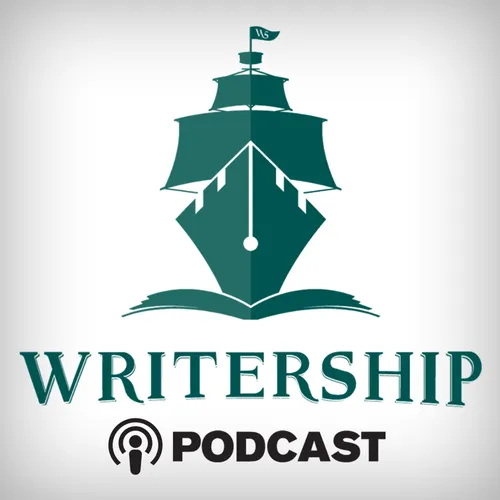
The Writership Podcast Editing Tips For Fiction Authors
On the Writership Podcast, professional book editor Leslie Watts critiques five pages of fiction from writers who are, or soon hope to be, traditionally or independently published. The submissions come from actual authors who understand they may need help seeing the flaws in their stories and are brave enough to share this experience so that you might improve your writing too.
- Update frequency
- every 8 days
- Average duration
- 40 minutes
- Episodes
- 136
- Years Active
- 2015 - 2019

Episode 57 - "The Man on the Motorcycle," Supernatural Short Story Critique
Leslie & Alyssa critique "The Man on the Motorcycle," a short story by Sean Seebach. They discuss point of view, character and plot arc, and genre considerations.

Episode 56 - Mystery at Blackstone’s Stables, Historical Mystery Critique
Alyssa & Leslie critique the opening of Saralee Etter’s Mystery at Blackstone’s Stables, and discuss deft character descriptions, bridging tension, and setting.

Episode 55 - Underneath - A Merfolk Tale, Science Fiction Critique
Leslie & Alyssa critique the opening of M.N. Arzu’s Underneath, and discuss foreshadowing, verb choice, repetitive sentence structure, and genre considerations.

Episode 54 - Raven’s Peak, Paranormal Fiction Critique
Alyssa & Leslie critique the opening of Lincoln Cole’s Raven’s Peak, and discuss tone, using secondary character reactions to develop your reader’s understanding of the protagonist, restraint in deli…

Episode 53 - Martha’s Dream, Literary Fiction Critique
Leslie & Alyssa critique the opening of Genya’s literary fiction novel, Martha’s Dream. They discuss sentence and paragraph length, poetic language, and reconciling adult-like observations with the p…

Episode 52 - Hard Reboot, Dystopian YA Critique
Alyssa & Leslie critique the prologue and opening of chapter one from JF Erickson’s Hard Reboot. They discuss worldbuilding, advanced dialogue punctuation, maintaining tension, and stage direction.

Episode 51 - The Humanarium, Science Fiction Critique
Leslie & Alyssa critique the prologue of Chris Tick’s The Humanarium, a science fiction novel. They discuss classic scene structure, grounding the reader, worldbuilding, and characterization.

Episode 50 - Feather the Painter, Fantasy Critique
Alyssa & Leslie critique the opening of Mary Pat Lynch’s Feather the Painter, a fantasy novel. They discuss repetitive sentence structure, tension, sensory detail, dialect, and getting to know settin…

Episode 49 - Awakened: Paragons Book One, Superhuman Thriller Critique
Leslie & Alyssa critique the opening of CS Manley’s Awakened. They discuss the opening device (amnesia), tension, setting, and the high polishing techniques that will make your writing lean.

Episode 48 - Generation Havoc, YA SF Critique
Alyssa & Leslie critique the opening of J.H. Lucas’s Generation Havoc. They discuss panoramic vs. intimate openings, developing tension, tone, diction, and worldbuilding.

Episode 47 - The Hipster Who Leapt Through Time, SF/F Critique
Leslie & Alyssa critique the opening of Luke K’s The Hipster Who Leapt Through Time, a science fiction/fantasy novel by Luke Kondor. They mention echoes and strengthening verbs. They discuss how the …

Episode 46 - The Bite of Rust, Fantasy Critique
Alyssa & Leslie critique the opening of Simon Cantan’s The Bite of Rust, a fantasy novel. They discuss unusual protagonists, characters’ emotional reactions, and effective hooks and world building.

Episode 45 - “The Quirky Old Couple” Fantasy Short Story Critique
Leslie & Alyssa critique Alysia Seymour’s “The Quirky Old Couple,” a fantasy short story. They discuss tension, action, and conflict, repetitive sentence structure, and earning back story.

Episode 44 - Society, Urban Fantasy/Thriller Critique (Explicit)
Alyssa & Leslie critique the first five pages of Kinda Ra Harashal’s Society, an urban fantasy/thriller novel. They discuss grounding the reader in a fantasy world, nailing your genre and audience, a…

Episode 43 - The Book of Fawla, Fantasy Critique
Leslie and Alyssa critique the first chapter of Edward Antrobus’s The Book of Fawla, a fantasy serial. They discuss telling detail for characterization, setting, and props, amping up your verbs, payi…

Episode 42 - Untitled Thriller Critique
Alyssa & Leslie critique the opening pages of a thriller by AD Davies. They discuss the genre and maintaining tension, and get into some granular detail on verb tense and dialogue tags. Put your gram…

Episode 41 - “The Flagstone in Ms. Leech’s Garden,” Middle Grade Horror Critique
Leslie & Alyssa critique Todd Gerring’s middle grade horror short story. They discuss considerations when writing horror for this audience, 3rd person distant POV, building sympathy for your characte…

Episode 40 - Pleasure Point, Romance Critique (explicit)
Alyssa & Leslie critique the opening of Jennifer Evans Kochalka’s novel, Pleasure Point. They discuss the romance genre, character reactions, and get into the nitty gritty of compound words, spaces a…

Episode 39 - Guest of Honor, Suspense Novelette Critique
Leslie & Alyssa critique the opening of Mark S.R. Peterson’s novelette, Guest of Honor. They discuss the suspense genre, prepositions, present tense, tension, characterization, and point of view.

Episode 38 - “One’s Place,” Science Fiction Adventure Critique
Alyssa & Leslie critique the opening of a science fiction adventure story, “One’s Place,” by Edwin Downward. They discuss characterization, setting, lingering questions, plot devices, and diversity i…